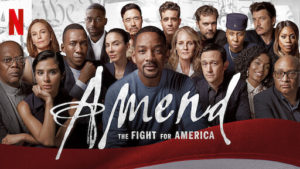Amend: The Fight for America Reminds America of its Promise

“What do you think about when you think of America?” actor Will Smith poses this question at the beginning of his six-part Netflix documentary Amend: The Fight for America (released last month). We hear “This Land is Your Land” sung as we see images of the Statue of Liberty, fireworks, baseball, apple pie, the moon landing, etc. Then we dive into the heart of the series by learning about the history and impact of the Fourteenth Amendment, and how people struggle to be recognized by the U.S. government and other Americans.
This must-see limited series seamlessly blends narration by Will Smith and others (including Randall Park, Larry Wilmore, Lena Waithe, Utkarsh Ambudkar, and Gabriel Luna); interviews with historians, professors, and activists (who share their personal stories as well as professional knowledge); dramatic historical readings by actors; and powerful animation often using the episode title as a metaphor. It juxtaposes archived photos and videos with current ones, showing the links between past and present movements and the intersectionality of justice.
The first episode, “Citizen,” gives the background of how and why the Fourteenth Amendment was ratified in 1868 and the celebration and backlash it received, further explored in the next episode, “Resistance.” Black Americans continue to be told to “Wait” (the title of another episode) for change throughout 100 years of attacks on their freedom, rights, and life. As technology advances, more Americans are able to see the violence happening to Black people, first on television and now on social media, causing more to speak up and take action on systemic change in schools, the workforce, our courts, politics, and personal interactions. Then in episode four, “Control,” we travel back and forth in time to follow women’s fight to be equal citizens and the additional challenges for women of color (including an interview with civil rights advocate Kimberlé Crenshaw who coined the term intersectionality). The “Love” episode celebrates the decisions of Loving v. Virginia and Obergefell v. Hodges that expanded marriage equality and benefits. The series ends reminding us of America’s “Promise” to immigrants of peace, better opportunity, and a brighter future.
Despite political focus on the First and Second Amendments, our identity as citizens is embedded in the Fourteenth and it’s cited in more litigation than any other amendment. It is here that we are guaranteed “liberty” and “equal protection of the laws”, but the fear of other people—often coupled with the fear of losing power—keeps us from recognizing our shared humanity. The Fourteenth Amendment is pivotal in moving America from a white male dominated nation to a diverse and just democracy. The series shows how fragile our government is when individuals, parties, and states are not held accountable for violating people’s rights. We see people beaten and killed for trying to live their lives. We see multiple campaigns to imprison and deport people without due process because they were deemed criminal based on their race (see also Netflix’s 13TH documentary on the incarceration of African Americans). We see attempts to separate people based on race, gender, religion, ethnicity, and sexuality, instead of recognizing the worth and dignity of every person and valuing the many identities we each hold.
One of most impactful scenes is one that shows different children’s faces with historical audio of adults (some recognizable voices) saying slurs. You can hear the hate in their voices, as if they were speaking to a problem instead of a person. It challenges the audience member with the idea that maybe you wouldn’t use those slurs, but are you confronting people who do? Maybe you know about our country’s injustice, but are you educating others and are you still learning from others to understand their experiences? Are you speaking up for equality and uplifting the voices of others, enabling them to be themselves and protected by law? How are you showing up for our Fourteenth Amendment rights?
